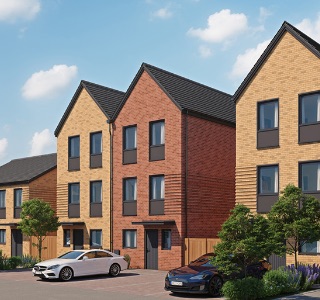Anti-social behaviour & neighbour nuisance
Frequently Asked Questions
Anti-social behaviour (ASB) includes a wide range of unacceptable behaviours that affect the quality of life for residents or other people living in our areas.
What may be considered as anti-social behaviour:
We believe that everybody has the right to a safe place to live. That’s why we here at Love Living Homes always take any reports of anti-social behaviour extremely seriously.
We would consider the following as normal everyday life and not anti-social behaviour:
- Sounds and smells of everyday life
- Outdoor playing and one-off parties
- Looks, stares or comments on social media
- Laughing, talking and crying babies
- Parking issues
- Boundary issues
- Dogs barking and issues with pets
- Untidy gardens
Before reporting anti-social behaviour to us, here are some ways in which you can approach the situation:
- Approach your neighbour
It’s likely that your neighbour would prefer that you speak to them first before contacting us, as they may not be aware they are causing a problem. Calmy explain how their actions or behaviours are making you feel. Use language like such as:
“when you do ________ it makes me feel _______"
In most instances, having a calm conversation with your neighbour is the best way to resolve any issues.
We would never ask you to handle cases of anti-social behaviour if you don’t feel safe, or if criminal acts have been carried out.
2. Keep a record of any incidents that occur
Keep a record of when, where and who is involved with the anti-social activity, writing down as many details as you can. It is important that you are able to provide as much information as possible should further action needed to be taken.
3. Contact us
We may ask that you and your neighbour to consider mediation. This is using an independent person to work with you both to find a solution
If it continues, we will talk you through the next stage as there are a number of options available.
Legal actions will only be taken where incidents are severe.
To report any anti-social behaviour please contact us.
All reports of harassment are taken seriously and the safety of residents and their
households is always most important. Maintaining good estates and promoting cohesive communities is a top priority to us.
We will follow up your complaint as quickly as possible and need your co-operation to help us deal with anti-social behaviour effectively. We will respect your confidentiality at all times.
We take all reports of anti-social behavior very seriously here at Love Living Homes.
We’ll keep you up to date with the progress of your case and what actions that we can take. In some cases, we might need to get other organizations involved such as environmental services or the police.
There’s lots of different ways we can tackle anti-social behavior. These include making full use of the legal powers available to us and working with partner agencies to provide support to victims.
The best thing to do is avoid action that might cause a nuisance to others.
For example:
- Be considerate of your neighbours.
- Do not carry out loud work at night including repairs
- Talk to your neighbours if you intend to have a party
- Do not play your TV, radio, hi-fi or musical instruments too loudly
- Keep your dogs and other pets under control
- Be aware of where your children are playing, who is supervising them and what they are doing
- Talk to your children and visitors if their behaviour is likely to cause a nuisance or
harassment to other people - Dispose of rubbish and waste in an appropriate manner
We recognise sometimes behaviour will be annoying or disturbing, but not reach the threshold of anti-social behaviour under our definition.
We will always strive to help resolve the situation, but it is extremely unlikely we will be able to take enforcement action against a tenancy or lease for this behaviour.
Behaviour we consider nuisance includes:
- Inconsiderate parking
- Lifestyle differences, such as different times of going to bed
- Noise that does not meet the ASB definition
- Neighbour disputes
- Garden or boundary disputes
- Pet or animal nuisance
Please contact us
Unfortunately as your landlord or managing agent we have very limited powers to take action when it comes to noise nuisance.
Below looks at some of the ways you can deal with noise problems.
Government advice recommends using a stepped approach for dealing with
noise problems:
1. Keep records of the noise
Try to keep a record of the noise as soon as it breaks out. Log the date, time,
type of noise and how it's affecting you. This information could be essential to
back up your complaint should you want to escalate it, and it could be used in
evidence if you go to court.
2. Start building a relationship with your neighbour causing the problem
If you decide to approach your neighbour about their noise, wait until a suitable
time. Even if you feel angry about it, try not lose your temper — it could be
used against you at a later time. Plan what you are going to say and keep calm.
Before you approach them, it's important to consider whether there's a risk to
your safety. If you feel threatened or intimidated by your neighbour and you're
worried they will get aggressive, then approaching them might not be the best
option. In these situations, it's probably best to contact the police.
Most problems can be solved amicably without any need for further action.
You might feel nervous about approaching your neighbour but they may
genuinely be unaware that they are causing too much noise. Often they will
be embarrassed about the nuisance they have been causing and will be more
considerate in future. But it's important to do this as early as possible before
the problem spirals out of control.
3. Try to have a quiet word with them about the problem
4. Have a stronger word and explain the impact their noise is having on
you (and your family)
5. If things don't improve, consider going to a mediation service
Neighbour mediation is a useful process where a third party helps people living
in the same neighbourhood resolve disputes. It aims to assist both parties in
identifying each other's needs, sorting out problems, exploring solutions and
negotiating an agreement.
Mediation often helps preserve neighbourly relations or build better ones and
it can calm disputes before they escalate. Most services are registered charities
although some are part of other organisations like local authorities or Citizens'
Advice
6. If that doesn't work, ask your local authority to take action
Your local authority has a statutory duty to investigate complaints. Under
Section 80 of the Environmental Protection Act 1990, the Environmental Health
Officer (EHO) is required to take “all reasonable” steps to assess whether the
noise constitutes a statutory nuisance.
If the EHO is satisfied that there is a problem, or one is likely to occur or
reoccur, then they have to serve a noise abatement notice. But they may
suggest other ways forward:
• Mediation: Many local authorities have independent trained mediators
who will offer to mediate between you and your neighbour.
• A warning letter: Some local authorities may send a warning letter. This
might be affective, but it can backfire - it can alert the neighbours to the
fact that you've complained so the noise may become more intermittent.
Collecting evidence may then become a problem.
• An abatement order: Ultimately, if the noise persists and the local authority
has deemed the noise a statutory nuisance, they have a duty to serve a
notice on the offenders. If the offender fails to comply they can face court
action. The local authority also has the power to confiscate any equipment
that's causing the nois
7. If there's nothing your local authority can do, speak to an abatement
society
8. As a final resort, take legal action yourself
f your local authority doesn't take action, or if you decide not to involve them,
you can take a noise issue to a magistrates' court. The magistrates' court will
need to be persuaded that the problem amounts to a statutory nuisance.
This is why it's important to keep a record of the dates, times and duration of
the noise as well as a description of its nature and the distress it causes you.
Before you go a magistrates' court you should seek some good advice from
Citizens' Advice, a solicitor, or the clerk at the local courts. But bear in mind
there's no legal aid for these kind of cases.
Got another question? Contact us here.



